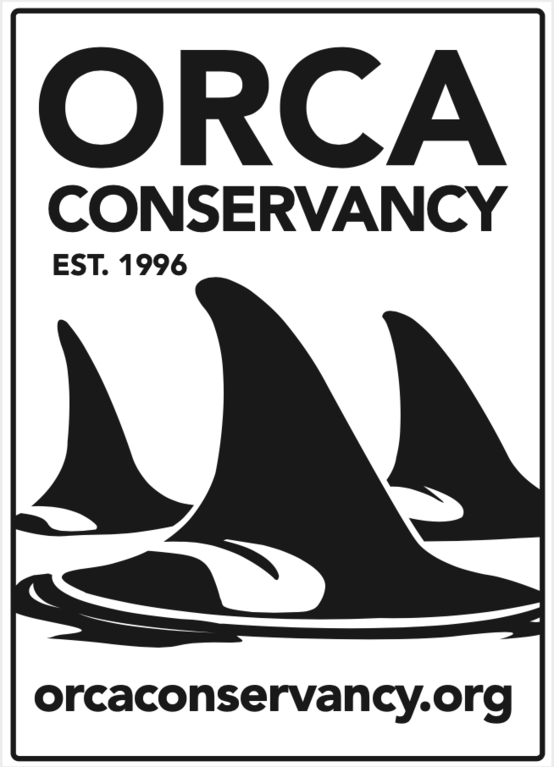Oil Spills, and Killer Whales ... !!!
James Ives, Guest Blogger for Orca Conservancy.
Southern Resident Killer Whales (SRKW), face many human made threats which continue to contribute to this critically endangered populations decline. As of June 1, 2021, this population has 75 members total across the three pods (J-, K-, and L-pod).
One of the most dangerous threats SRKW could be exposed to, are oil spills. It's difficult to simplify the damaging effects oil spills have not only on killer whales, but the entire ecosystem involved. In the past killer whales that come in contact with large amounts of oil suffer from skin and eye irritation, ulceration, and internal medical problems when oil is consumed and enters their body. The takeaway is that SRKWs have a hard time surviving as it is. SRKWs daily face what we call the three legged stool; 1. food depletion, 2. high toxic loads, and 3. vessel traffic noise. What we don't talk about as often is the potential of an oil spill within critical habitat of this critically endangered population. An oil spill that will almost guarantee not only a major decline but an irreversible path to extinction.
It’s been 26 years since the Exxon Valdez supertanker slammed into a reef, releasing nearly 11 million gallons of crude oil and destroying hundreds of thousands of animals, from sea otters to bald eagles, in and around Alaska’s Prince William Sound. 
The "Chugach transients," as they're called, had 22 members before the oil spill. After the oil spill, nine immediately disappeared and were presumed dead, likely from ingesting or inhaling oil. Another six went missing. Now the Chugach transients are down to seven. Not one calf has been born since the spill, and the two remaining females are too old to reproduce. The pod will soon die off. (Image below: Killer whales swimming in Prince William Sound alongside boats skimming oil from the Exxon Valdez oil spill (State of Alaska, Dan Lawn).
Additionally, another population of killer whales living near Prince William Sound population decreased significantly faster. Before the oil spill, there were a total of 35 killer whales in the AB pod. After the oil spill 14 of the whales of that population died. Now three decades later whales of this pod are still trying to recover from the damaging effects of this oil spill.
HOW CAN WE DO BETTER?
Obviously, first and foremost prevent oil spills from happening!
If an oil spill does occur there are several hazing methods being used to direct killer whales away from an oil spill. These methods include:
- Acoustic deterrent devices: these devices create sounds that are not loud enough to be painful to killer whales but they can hear the device and ultimately be led away from an oil spill
- Pre-recorded killer whale calls
- Oikomi pipes: oikomi pipes are made out of reverberant metal that is used to lead killer whales away from an oil spill
- Boat traffic can give noise and motion that leads killer whales away from an oil spill
- Helicopters can be used to make a considerably loud noise and wave movement at close range making a killer whale stay off course of heading in the direction of an oil spill
- Fire hoses are used to shoot streams of water at whales making them change their course of direction
Politically speaking, it's important to know in 2018, the prior administration set out a plan to allow oil and gas companies to drill along the coastal waters of Oregon, Washington, and a majority of all U.S coastal communities. Congress was considering removal of the Marine Mammal Protection Act (MMPA), regulations which has protected killer whales and other marine mammals for more than 40 years. The removal of the MMPA would make it possible for oil drillers and gas companies to transport and drill for oil along Washington, and Oregon's coast opening up an opportunity for an oil spill to occur similar to the Valdez spill.
In January 2021, under the new administration, Congressman Jared Huffman (D-San Rafael) announced the West Coast Ocean Protection Act and the Stop Arctic Ocean Drilling Act to permanently protect these places from the dangers of offshore oil drilling. This comes as President Biden continues to sign a series of executive orders focused on combating climate change and moving the United States away from fossil fuels and expanding alternative, renewable energy, including suspension of new offshore leases under the next five-year plan. The bill hope to ensure the sustainability of SRKWs, marine life, coastal communities, and billions of dollars of wages to those with jobs that need the ocean to be clean and healthy to make a living.
"I, along with many environmentalists, are against oil drilling along the Oregon, Washington, and California coast due to the large possible risk of dangerous oil spills towards the sea life in these waters. I believe that the passing of this bill will help the continuation of the protection of the health and safety of the SRKW population". ~James
GET INVOLVED! Contact, thank and support your local representatives listed here: Original cosponsors of the West Coast Ocean Protection Act include Rep. Nanette Barragán (D-CA), Rep. Earl Blumenauer (D-OR), Rep. Suzanne Bonamici (D-OR), Rep. Julia Brownley (D-CA), Rep. Salud Carbajal (D-CA), Rep. Tony Cárdenas (D-CA), Rep. Peter DeFazio (D-OR), Rep. Suzan DelBene (D-WA), Rep. Mark DeSaulnier (D-CA), Rep. Anna G. Eshoo (D-CA), Rep. John Garamendi (D-CA), Rep. Raúl M. Grijalva (D-AZ), Rep. Pramila Jayapal (D-WA), Rep. Ro Khanna (D-CA), Rep. Derek Kilmer (D-WA), Rep. Rick Larsen (D-WA), Rep. Mike Levin (D-CA), Rep. Alan Lowenthal (D-CA), Rep. Doris O. Matsui (D-CA), Rep. Jerry McNerney (D-CA), Rep. Grace Napolitano (D-CA), Rep. Eleanor Holmes Norton (D-DC), Rep. Jimmy Panetta (D-CA), Rep. Lucille Roybal-Allard (D-CA), Rep. Adam Schiff (D-CA), Rep. Brad Sherman (D-CA), Rep. Adam Smith (D-WA), and Rep. Mark Takano (D-CA).
